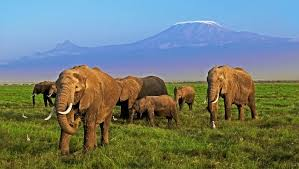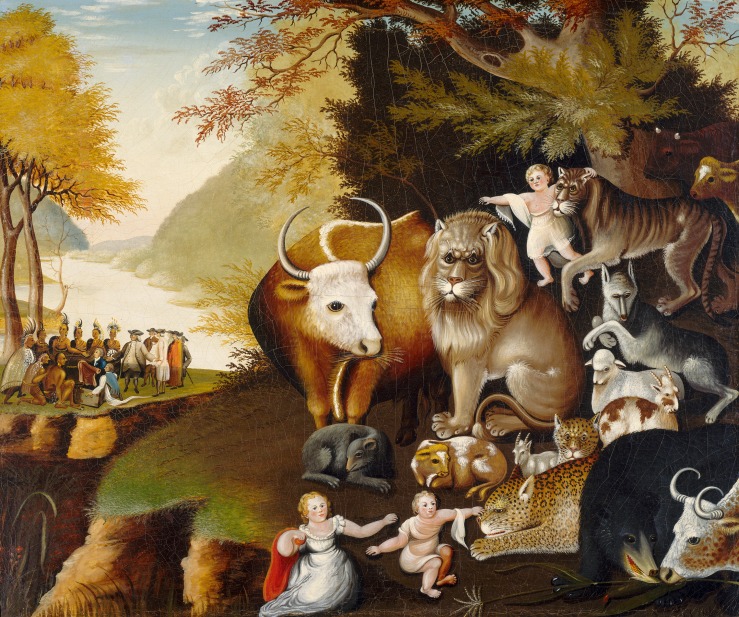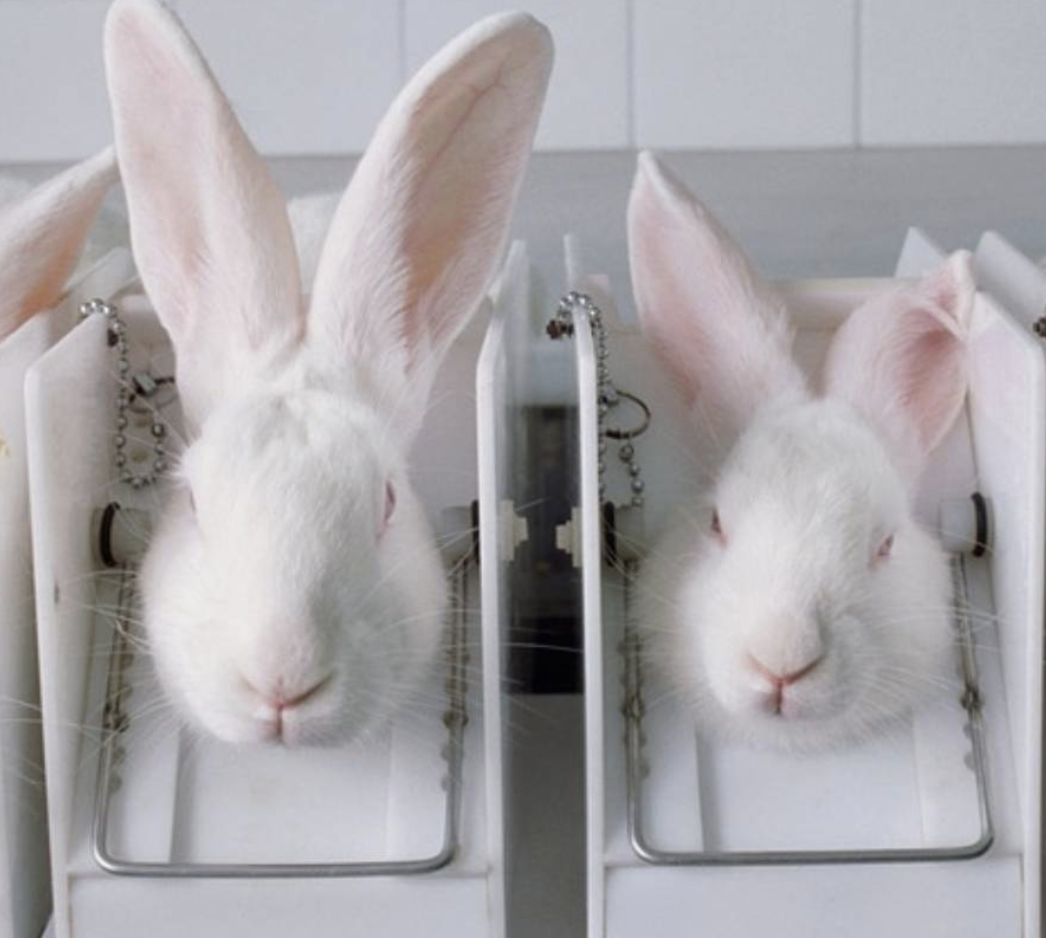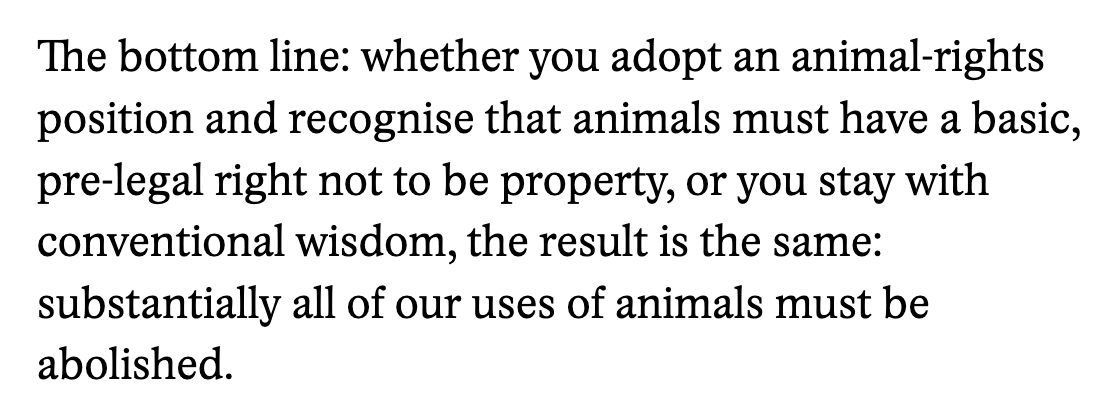- Please do the participation assignment at Canvas.
- You have until Wednesday at 11:59 pm to do course evaluations at Canvas.
- No regular office hours this week, but I'll have office hours Thursday at noon.
- Feel free to send questions by email
- Use the final study guide above!
12.09.2024
Review
12.06.2024
Hunting
Monday: review. Study guide is at tab above. Come with questions!
_________________________
Laurence Cahoone, "Hunting as a Moral Good"
Is hunting ethical?
_________________________
_________________________
- let's assume animals DO matter in the way Singer/Regan think
- proposes a "meliorist principle"--a meliorist is someone who thinks we can make a better place; a reformer or crusader
- meliorist principle: "humanly caused animal death and suffering should be reduced as much as possible, hence allowed only if necessary. 'Necessary' must refer to goods of ecosystems, or human goods or rights, sufficient to justify the animal death or harm." (Cahoone p. 495)
- Cahoone's goal: show that enough good can come of hunting to justify the death and harm to animals, even if animals do have moral status
- the sport of killing animals--for fun or challenge. (Cahoone: No!)
- p. 496 -- not a sport, but a "cultural trophic practice"..."a practical approximation of an archaic activity" -- like gardening, baking bread, knitting
- Hunting: deer hunting (for venison)
- Not hunting at all: trophy hunting, killing for fun, using ducks as targets
- animal eaten, not wasted (p. 498)
- animal killed quickly (p. 497)
- death by hunter causes no more suffering, compared to wild death (p. 499)
- death by hunter causes no more suffering, compared to death associated with plant farming (p. 499)
- hunters take place of missing predators (wolves, cougars), needed for population control (p. 499)
- hunter embodies "self sufficiency" and "trophic responsibility" and "ecological expertise" (p. 501)
- hunter recognizes place in nature relative to animals, feels respect and graditude (p. 501)
- hunter is honest about killing animals for food (they "face their food") (p. 502)
- hunter "does not add to but replaces some part of the massive, anonymous animal suffering caused by unseen consumers, omnivores, and vegetarians, with pain caused personally and directly, in which the anmal's life and death are intimately recognized and responsibility taken." (p. 502)
- "hunter allows the animal its wild life" .(p. 502)
12.04.2024
Animals in captivity
Going to the zoo/aquarium as an "ethical detective"
Observational questions
- Did you witness pleasure/happiness? (Balcombe)
- Did you witness pain/distress? (Singer, Yong, Johanssen)
- Did the animals seem to need more liberty instrumentally -- i.e. to meet their needs? Does their captivity seem to reduce their wellbeing? (Gruen)
- Did the animals have wild dignity? Did they have a little? A lot? (Gruen)
- Definition: wild animals have "wild dignity" to the extent that they have their own lives, live in their own world, and possess a kind of sovereignty.
- Are zoos just fundamentally violating the most basic rights of animals? What are these rights? (Regan)
- Are captive wild animals better off than animals in the wild in any way? Are they avoiding "vast suffering"? (Johanssen)
- Are zoos using captive animals to benefit animals in the wild? What conservation claims do they make? Is it OK to use animals this way? (Regan, Kant)
- Do the animals need more liberty intrinsically -- i.e. because liberty is fundamentally good for animals? (Gruen)
12.02.2024
Animals in captivity
Module 5: Wild animals
- Wild animals in the wild (before Thanksgiving)
- Is there a vast problem of wild animal suffering?
- Intervention vs. laissez faire (Singer vs. Plamer/D&K)
- One-off intervention vs. systemic intervention (gene drives)
- helping one species (spotted owls) by killing individuals of another species (barred owls)
- Wild animals in captivity (today and Wednesday)
- zoos and aquariums (field trips discussed Wednesday)
- sanctuaries
- Hunting wild animals (Friday)
_________________________
Lori Gruen, "Dilemmas of Captivity"--from Ethics and Animals: An Introduction
Judging zoos, aquariums, etc.
- Are they good or bad for the individual wild animals who live there?
- Are they beneficial for wild animals still in the wild? Do they foster conservation effectively?
 |
| Question 1: Are they OK? |
_________________________
Gruen: captivity is generally bad for captive wild animals for two reasons--
- Loss of liberty
- Loss of wild dignity
Gruen's points about liberty
- Liberty is instrumentally good for wild animals
- in captivity they usually have unmet needs
- example: birds in aviary can't fly; zugunruhe
- next time: your observations
- Liberty is intrinsically good for animals--constitutive of their wellbeing
- however well off an animal is, they'd be better off if they freely met their own needs
 |

Kantian dignity: humans have dignity because they are self-aware, adopt their own goals, and understand right and wrong. Gruen: no application to animals.Political dignity: humans have dignity to the extent they are recognized as citizens in a society--can speak, assemble, vote, etc. Gruen: no application to animalsAnimal dignity: any being has dignity to the extent it can exercise its species-specific capacities. Wild and domesticated animals can have dignity, potentially. Gruen's doubts: Is every natural animal behavior really dignified?Wild dignity: wild animals have dignity to the extent that they have their own lives, live in their own world, and possess a kind of sovereignty. Captivity deprives wild animals of this sort of wild dignity. Gruen: this is the right concept for wild animals, but has no application to domesticated animals.
_________________________
interlude: dignity and domesticated animals
NYT--Intergroomer contest
Gruen: No loss of wild dignity (dogs can have none), but treated as objects
- Loss of liberty (instrumentally and intrinsically bad)
- Loss of wild dignity
- Other?
- Solves the problems that cause wild animal suffering!
- predation?
- low infant mortality
- no drought or famine
- no hunters
- for chimpanzees retired from animal labs - Chimp Haven
- for elephants who didn't thrive in zoos - The Elephant Sanctuary
- for wild animals who didn't work out as pets
- for rescued dogs, cats, farm animals (domesticated)
11.22.2024
Do species matter?
Individuals vs. species
- Caring about "this spotted owl"--i.e. an individual owl
- Caring about "the spotted owl" -- i.e. the species
- Species first!
- accepted by conservationists and environmentalists
- accepted by state and federal wildlife managers
- Individuals first!
- accepted by animalists
- Barred owls plentiful
- crowding out northern spotted owls and California spotted owls, which are endangered
- US Fish and Wildlife service plans on killing a million barred owls to save the spotted owl
- killings not seen as bad
- this outcome seen as good (below)
 |
| Left: Oregon, all barred owls, larger number of owls Right: Oregon, barred owls + spotted owls, smaller number of owls |
- via deception
- is it wrong to deceive animals?
- using lures in hunting and fishing (something to discuss when we get to hunting)
- like Johannsen, worried about wild animal suffering, predation
- lots of arguments, but let's focus on this:
- "It would be good to prevent the vast suffering and countless violent deaths caused by predation." (last paragraph)*
- It's less obviously good to preserve a species. (last paragraph)
- Genetically altering carnivores is risky given our current scientific knowledge.
- Many species are endangered and we can't save them all. THEREFORE,
- We should prioritize saving herbivores and let the carnivores go.
- clearly causing the barred owls to suffer
- unclear benefit of saving the species of spotted owls
- not saving any prey from suffering, because both species are carnivores
- by reintroducing into Yellowstone
- But wolves kill caribou and other animals
- McMahan: just let them go extinct!
- in Texas
- Just let them go!
- lion tourism
- Just let them go!
11.20.2024
11.18.2024
Editing wildlife
Paper
- Follow all instructions
- Adhere to the honor code
- Making objections
- relevant to all three types of papers
- don't just "use Singer against Regan" or "use Regan against Singer"
- come up with your own objections
- better to make a FEW objections FULLY, not make a large number
- read very, very carefully...take notes...go for a walk ... and objections will occur to you
- Develop the objection--
- clarify, restate, elaborate
- support with facts, if relevant
- make an analogy
- strengthen by considering what author would say
- etc.
_________________________
Recap
Assisting wild animals (two basic approaches)
- Laissez faire--intervene in C situations, rarely D, one-off solutions; based on respect for "wild sovereignty" (D&K); based on responsibility (Palmer)
- Interventionists -- intervene in C & D, possibly large-scale; based on moral status of individual animals, equal consideration of interests
- Conventional intervention
- Gene-editing intervention (Johannsen)
STEP 1: There is vast wild animal suffering
STEP 2: We should intervene to reduce the suffering; large-scale solutions involving gene drives should be considered seriously.
_________________________
Interview: Johanssen on “bottlenecks” and objections
Survivor bias
Underestimation of number of wild animals
"Natural is good"
Religion
Conservation goals--healthy ecosystems, restoration, species preservation, NOT individual animal welfare
Chap 5: Gene drives vs. conventional aid: why gene drives are better!
- Gene drives--release edited animals, then no further interference
- Conventional aid -- must intervene over and over again, so more interference
- protect prey from predators
- vaccinate against diseases, medicate
- rescue and rehabilitate after natural disasters
- restore habitat after natural disasters
_____________________
Debate topics:
- Should we use gene drives to prevent wild animal suffering?
- Yes, Johanssen is right
- No
- Should we be laissez faire or interventionist about wild animal suffering?
- laissez faire--mainly intervene when humans are responsible (C cases)
- interventionist--also intervene when humans are not responsible (D cases)...but could restrict intervention to conventional means
- What is wrong with Johanssen's view?
- A - wild animal suffering not vast
- B - nature should remain natural
- C - the interventions won't work
- D - only the whole ecosystem matters, not each individual animal
- E - other
11.15.2024
Life in the wild
Papers
- Read paper instructions!
- Follow your plan (other papers not accepted)
- Give paper required structure (other papers not accepted)
- Follow the quotation rules for the paper
- Make sure you adhere to the honor code
- We will discuss more on Monday
_________________________
Two views of assisting wild animals
Laissez faire (let them be) view
- Should leave animal habitats alone
- C and D are different
- D cases: assistance not required, not wrong
- Should be one-off, not large-scale
- Reasons
- D&K - wild animal sovereignty, "wild animals are competent to address the challenges they face" (D&K p. 10)
- Palmer -- context, history, relationships make C and D cases different
- Should assist where possible and effective
- C and D not importantly different
- D cases: assistance can be required
- Assistance may be large-scale
- Reasons
- Singer's ethics (but he doesn't apply much to wildlife issues)
- equal consideration of interests, utilitarianism
- other reasons, perspectives: rights, justice
- "the amountt of suffering in nature probably exceeds the amount of pleasure in it" (Johansson p. 14)
- "Most individual wild animals live bad lives" (Johansson p. 14)
- Peacock's tail
- Male birdsong
- r-strategists--huge number of offspring, little investment, most die young
- K-strategists -- smaller number of offspring, large investment, more survive
- Mammals
- huge numbers killed by predators
- humans -- 2 per couple, one per partner -- replacement rate
- eaglets -- each female lays 2-3 eggs per year for 20 years
- leopard cubs--each female leopard has 2-3 cubs every 15 mo-2 years, over 10 years.
- puffins--each female puffin has one chick every year over 30 years
- 2/3 of wild animals eat other animals
- Prey die miserable deaths
- animal suffering
- animal pleasure--when do you think wild animals are enjoying their lives?
- Vaccinate wild animals against disease (already being done)
- Change r-strategists into k-strategists
- Turn carnivores into herbivores
- Reduce capacity for suffering
- Genetic engineering techniques that alter all descendants
- How? gene drives
- Choice of readings: chapter from Johansson's book OR an interview with Johansson
- We will also discuss what Singer says about wild animal suffering (ALN p. 255-259)...optional
11.13.2024
Wild and domesticated animals
Papers
- Revised plan due tonight
- Paper due 11/20
- Make sure you read instructions
_________________________
Module 5: Wild animals
- Do we have a duty to assist wild animals? (Nov 13, 15, 18, 20-debate)
- Today: one-off assistance, animals in special situations
- Friday: wild animal suffering, systemic assistance
- What matters more, wild species or wild individuals? (Nov 22)
- Wild animals in captivity -- zoos and aquariums (Dec 2, 4)
- Hunting wild animals (Dec 6)
- What are the individual animal's capacities, interests, rights?
- Should usually treat similar individuals alike
- Peter Singer: we have an obligation to assist in A, B, C and D (if possible)--forward-looking, should maximize future good
- Tom Regan: same? Not quite, because he mainly postulates negative rights--right to be left alone. So we'll focus on Singer.
- What are the individual animal's capacities, interests, rights?
- Must also ask: What is the context--our history and relations with the animal? Are we responsible?
- Palmer: A, B, C -- we should assist because we are responsible; D -- optional (not required, not wrong), because we are not responsible.
- D&K add: in D situations one-off assistance ok, but not widespread assistance; must respect "wild sovereignty"
- Xudum is the mother
- Musweu is the male intruder
- Film-makers are Brad and Tristan
- Watch 16-18:30 & 26:05-35
11.11.2024
Using animals for research
Preview
- Wednesday your revised plan is due (if requested)
- We'll start our last module: Wild Animals
- Clare Palmer article is bout assisting wild animals when they're in danger
- when are we obligated to assist?
- when are we obligated not to assist?
_________________________
The Animal Welfare Act: overview and lab animal highlights
- Which species? Covers warm-blooded animals, except rats, mice, and birds; not cold-blooded animals (fish, reptiles); lots of monkeys used, but chimpanzees excluded.
- Life in the lab Regulates housing, food; exercise for dogs, enrichment for primates
- Impact of procedures Requires anesthesia, analgesia; allows suffering that's integral to the experiment; only two surgical procedures per animal
- Oversight At local institution, IACUCs; federal inspections
- What's missing? IACUC doesn't assess harm/benefit balance
Cosmetic testingDraize Test - Household product testing
- Testing of redundant drugs
- Animal studies with unclear relevance to humans (psych studies)
- Repetitive studies
- Shouldn't say "never"--e.g. experiment on a mouse may lead to cure for cancer
- Before saying yes, perform the "human equivalent test."
- Also beware of the tendency to experiment on "outgroups"
- Nazi experiments on Jews
- Willowbrook experiments on intellectually disabled kids
- Tuskegee experiments on blacks
- But sometimes an experiment will be justified under the "non-speciesist ethical guideline"
- Example: Experiment involving 100 monkeys that led to discovery of "deep brain stimulation" (Tipu Aziz at Oxford); has relieved Parkinson symptoms in 40,000 patients; in 2018, more monkeys, 100,000 patients
- https://youtu.be/CgkUjVJFQRI (:45 - 2:45, 7:45-9)
- reaction of rights authors like Francione
- Singer is a Utitlitarian--our ultimate duty is to maximize total happiness (the balance of happiness over misery)
Some ethicist say no experimentation on animals should be done because it has no utility--i.e. you never learn anything about humansLarry Carbone respond to this, explaining the scientific process
11.08.2024
Using animals for research
Paper plans
- Make sure you number the parts of your answer--1, 2, 3. Resubmit if you didn't.
- The grade is just based on whether you met the paper-plan requirements, not on the quality of the plan.
- I will tell you if a revision is needed and give you comments to use in doing your revision.
- If no revision is needed you'll get a 5 on both the plan and the revised plan.
_________________________
Francione follow-up
- He says: property status is the biggest threat to animals
- And: animal protection laws ineffective as long as animals are property
- Today: what's going on in labs, how are they regulated (Singer, other sources)
- Monday: is the research justifiable? (Singer, others, Larry Carbone)
- worldwide, roughly 200 million animals killed for research annually
- worldwide, roughly 80 billion mammals and birds killed for food annually
- .25% of total killed for research
- psychopathology experiments
- product and drug testing
- medical research
- "monkey models of mental illness" (Steve Suomi) -- PETA whistleblower video -- what was the point?
- maternal deprivation (Harlow & Suomi) -- 1950s show about Harlow (6:00 - )
- abuse (Harlow & Suomi), quote on p. 38
- depression (Harlow & Suomi) -- the well of despair
- learned helplessness experiments (Seligman) -- shuttleboxes
- PTSD experiments -- a schedule of stresses (p. 52)
- Extrapolation from animals to humans (discuss Monday)
- Telling us what we already know, endless repetition
- Could learn from existing pathology in orphaned and abused animals and people
- inducing mental shock by hemorrhaging dogs (can't extrapolate)
- inducing alcohol addiction in dogs (can't extrapolate)
- Tour of an animal lab--Dr. John Young
- transparency strategy--don't let PETA be the only one to tells the publlc what's going on in animal labs
- like state fair showing farrowing stalls
- Americans for Medical Progress
- Lab animals: applies, but not to mice, rats, birds, cold-blooded animals
- Farm animals: doesn't apply except during transportation; doesn't apply to rodeos
- Zoos and aquariums: applies to warm-blooded animals, doesn't apply to birds
- marine mammals (p. 196, p. 213)
- You can file a complaint
- Pets: applies to those in pet stores and during transport
- Doesn't cover mice and rats, which are most of the lab animals
- Regulates HOW experiments are done, not WHICH are done
- Does NOT require a balance between harm to animals and benefit to humans
- IACUCs rubber-stamp proposals
- They do require balancing of harm and benefits
- No cosmetic testing
- No sales of cosmetic products tested on animals
11.05.2024
Animal companions
- Next use of animals we'll discuss: biomedical research (Fri & Mon)
- Reading just first 12 pages of Singer's 75 page chapter, but will discuss more Fri
- Paper plan is due Friday
- What's his ethical framework?
- What is he saying about pets?
- Singer--supports reforms of factory farming--based on equal consideration of interests, utilitarianism--not rights
- Francione--supports rights for animals
- a right is a "shield" protecting an animal's fundamental interests; a right "protects interests irrespective of consequences"
- animals have "a moral right not to be used as resources, irrespective of whether the treatment is 'humane'..."
- "the right not to be property" (F&C p. 3)
- being treated as property is the root cause of all ill-treatment
- we have some animal protection laws, but they are ineffective (next time we'll be looking at these laws)
- you can ask vet to euthanize a healthy animal you own
- animal farming practices incentivized by ownership
- You could reach some of the same conclusions from a simple, obvious premise
- "We should not impose unnecessary suffering and death on animals"
- Many people believe that when thinking about dog fighting (Michael Vick), bull fighting, maybe rodeos, etc. but....
- All animals have the right not to be property, we should stop exploiting animals
- People who agree: Tom Regan, Donaldson & Kymlicka
- D&K: pets and former livestock should become citizens
Wikipedia definition
- "Domestication is a multi-generational mutualistic relationship in which an animal species, such as humans...takes over control and care of another species, such as sheep...to obtain from them a steady supply of resources, such as meat, milk, or labor. The process is gradual and geographically diffuse... Domestication affected genes for behavior in animals, making them less aggressive...Such changes both make domesticated organisms easier to handle and reduce their ability to survive in the wild... not to be confused with taming."
- Examples -- here -- video
- the grey wolf (canis lupus) --> dogs (canis lupus familiaris)
- domesticated 14,000 years ago
- African wild cats (felis sylvestris lybica) --> house cats (felis sylvestris catus)
- domesticated 10,000 years ago
- Not domestication
- Keeping a wild animal in captivity
- Taming a wild animal
- breeding
 |
| NYT article |
- Because of the way they ARE, not just because of the way we TREAT them
 |
| F&C p. 12 |
- wild ancestors of cats and dogs: self-sufficient, skilled, fearful, avoid humans
- domesticated animals: docile, helpless, dependent, don't fear humans, can "read" humans, want our attention and praise, love us, can be obedient, like perpetual children
 |
| Would you rather be reborn as a wolf or a chihuahua? |
Pet action plan
- adopt, protect, animals who already exist--stop treating like property
- support sanctuaries for farm animals: P'nuts animal sanctuary, Copilot animal rescue
- don't breed more, spay and neuter

































